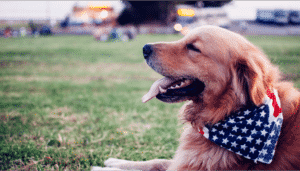Winter is in full-swing here in the Queen City! For most people, the cold season means ice skating, snow angels, and hot chocolate, but it also means ice, low temperatures, and harsh weather conditions. Make sure your pup is well taken care of with these helpful winter pet safety tips!
Know Your Pup’s Limits
Dogs come in all shapes, sizes, ages, and ability levels. Dogs who are thin, elderly, very young, or who have short coats will get cold more quickly since they are more vulnerable to the elements. Consider purchasing a doggy sweater or jacket for your pup, especially if they like to be outside. Also, monitor the amount of time your pup spends outside as exposed skin on noses, paw pads, and ears are at an elevated risk for frostbite and hypothermia.

Clean Their Paws
Dogs have an increased risk for salt poisoning during the winter months due to the chemicals used to treat icy roads and walkways. Pups can pick up various toxic substances such as rock salt, antifreeze, and de-icers when out on their daily strolls. Be sure to wipe their paws when you return home to prevent them from licking the chemicals and becoming sick. If your pup ingests rock salt or any other kind of de-icing agent, call a veterinarian immediately. De-icing agents should always be stored in a secure location that is out of reach from rambunctious pets, and any spills should be cleaned immediately to prevent poisoning.
Check Your Tires And Under The Hood
Cats tend to take up residency in the wheel wells of cars to keep warm during the winter months. Starting your car while they are sleeping on your tires can severely harm or even kill the animal due to moving engine parts. To prevent this, bang loudly on your hood, wheel well covers, or honk your horn before starting your vehicle. This allows the cat to wake up and escape before any potential harm can come to them.

Take Extra Precautions
Many people must walk their pups in the dark due to daylight savings, so be sure to avoid frozen bodies of water and use reflective gear such as jackets, collars, and leashes while out and about. Also, more pets become lost in the wintertime, so keep your furry friends leashed at all times during your excursions. Snowfall can disguise recognizable scents that typically allow animals to find their way home.
Provide Proper Shelter
Ideally, all pets should live inside. If this is not possible and pets must live primarily outdoors, bring them inside during freezing temperatures, especially in sub-zero conditions. When they are outside, they need a dry, draft-free shelter that faces away from the wind, and is large enough so they can sit and lay down comfortably, but small enough for them to conserve body heat. Make sure the floor is raised a few inches from the ground and covered in cedar shavings or straw. Additionally, the entryway should be protected with waterproof burlap or heavy plastic.
Feed Your Pet More Food
Animals need to consume more food in the winter to make up for the energy expended from generating body heat. Increase their meal portions to accommodate this need, and provide plastic food and water dishes – rather than metal – so your pet’s tongue does not stick to the dishes in low temperatures.
Have A Game Plan

Being prepared is an integral part of effective winter safety. Create an emergency action plan, or EAP, for your family and be sure to include your pets during the process. You’ll need an emergency kit with enough food, water, and medication to last your pet(s) at least five days. Also, arrange alternative shelter options if the need to evacuate arises.
Speak Out
Not everyone will take the necessary precautions to protect their pets in the winter months and it can be heartbreaking to see an animal suffering in a neglectful situation. If you see an animal who is not being properly cared for or if you suspect neglect and/or abuse, contact your local animal control agency to file a report. By making a report of alleged animal cruelty, the responding agency is required to investigate.
Need help making sure your pup is well tended to this season? Our Skipper team members receive seasonal-specific training to help keep your pup safe. For more info about our pet care services, visit our services or FAQ pages.





